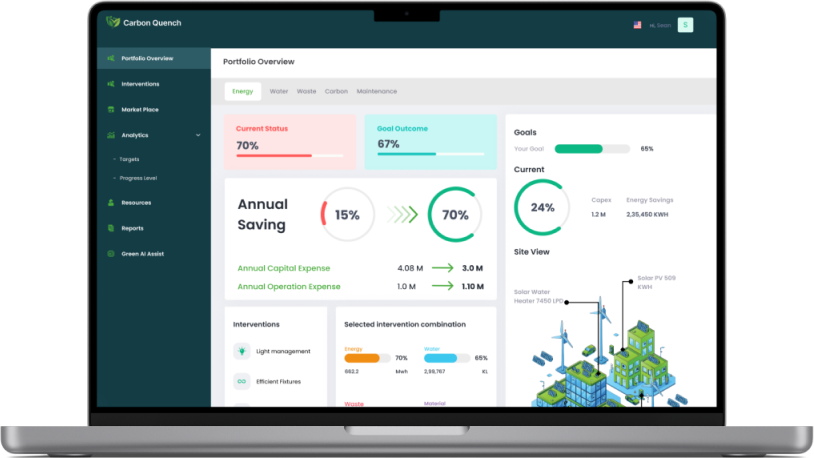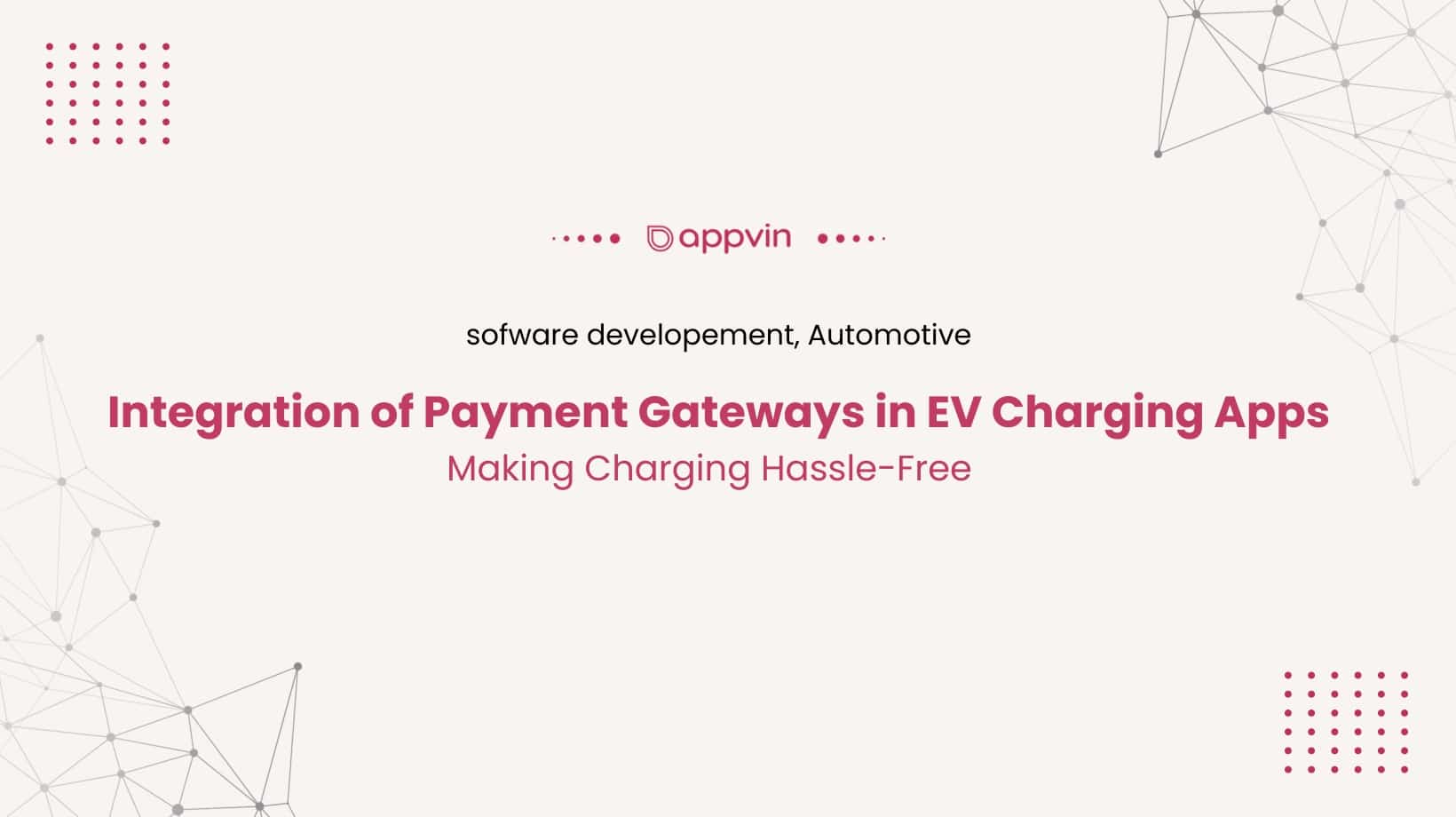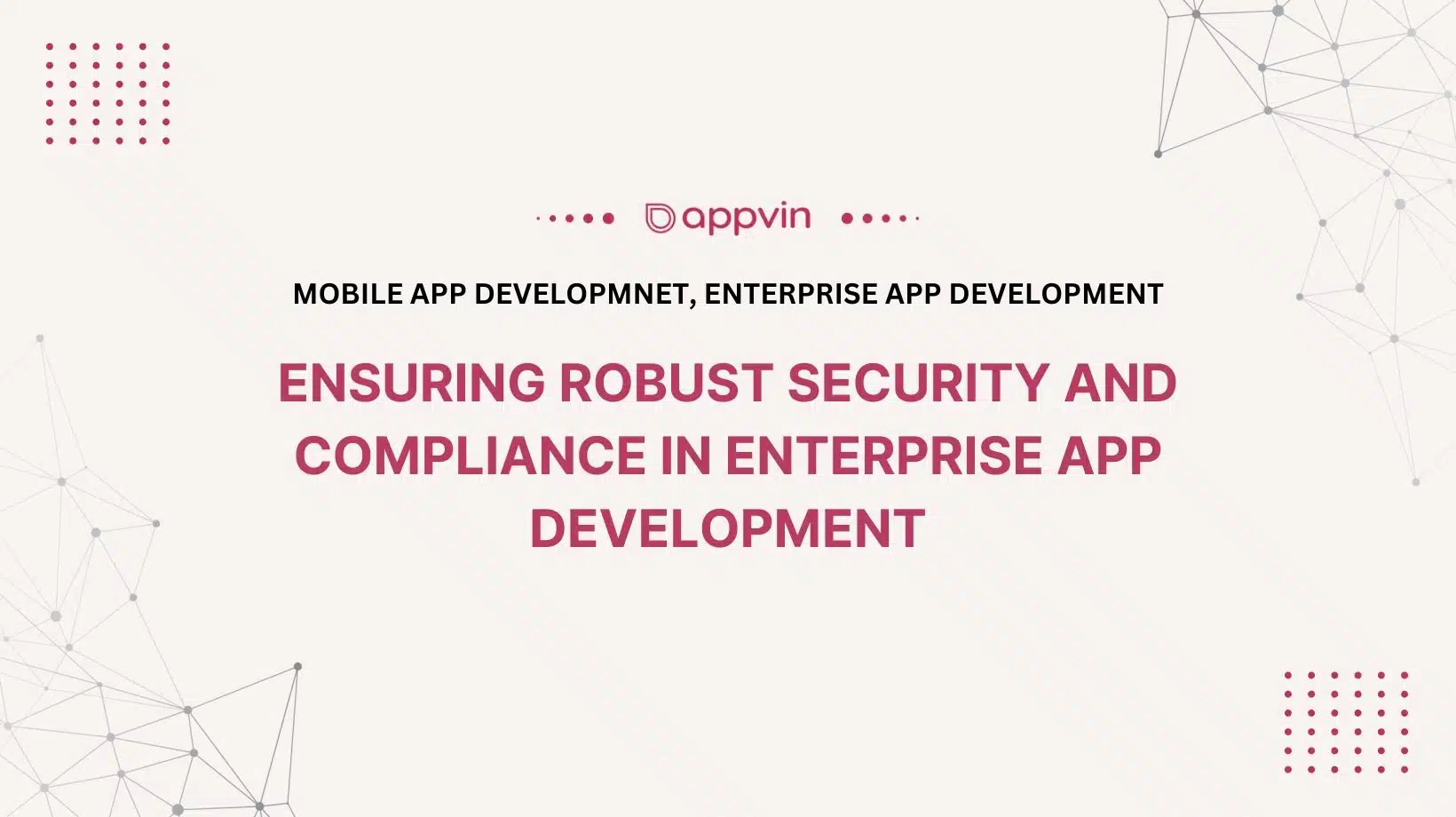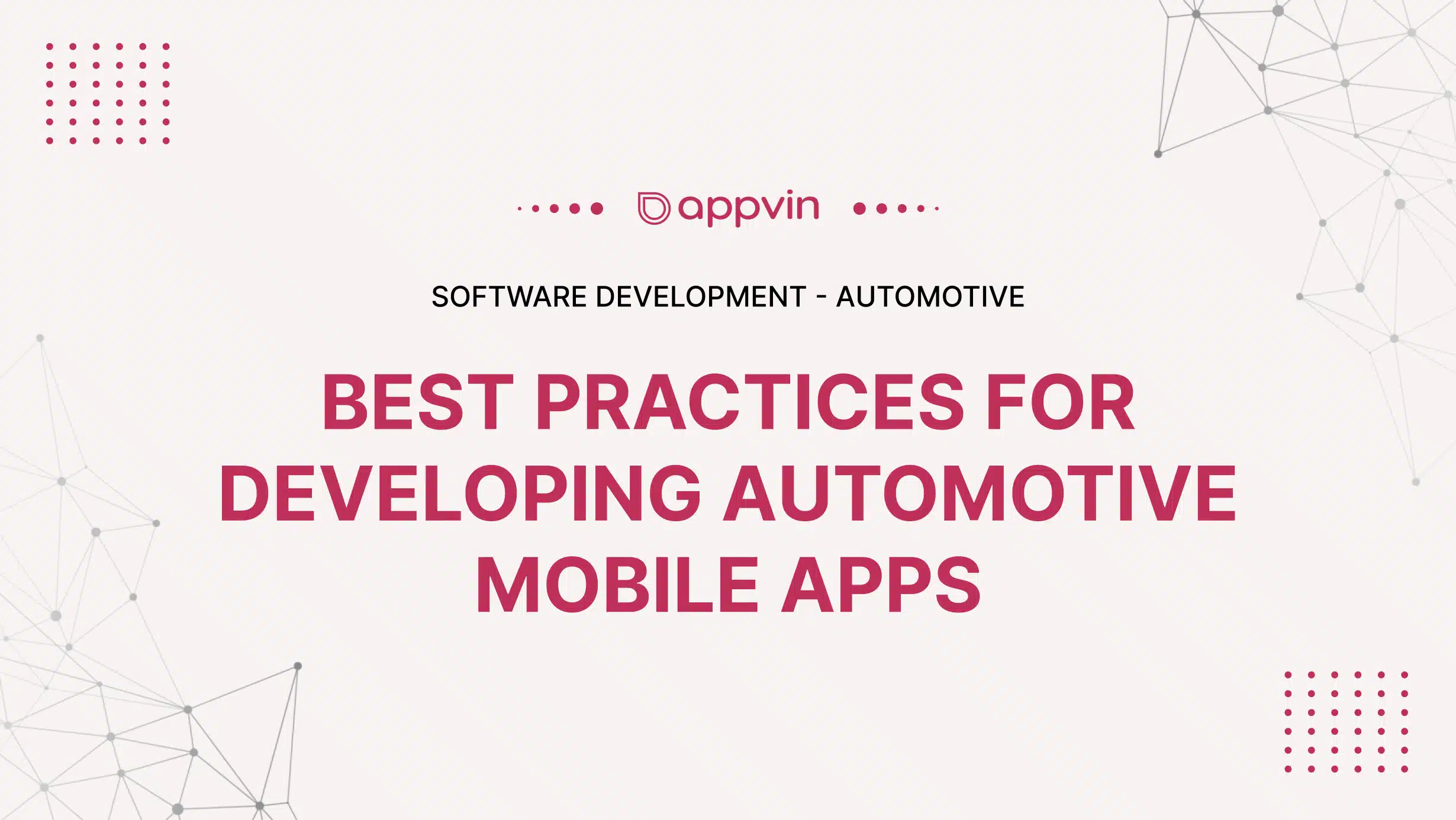The automotive world is rapidly evolving and at the heart of this transformation are mobile apps. As we know, smartphones become an important part of our lives, and automotive companies are now focusing more on mobile app development to enhance user experiences, purify operations, and stay in the competition.
The automotive industry is on a thrilling ride. Mobile applications are transforming how we interact with our vehicles, making them smarter, more efficient, and much more fun.
The exciting part is how these apps are opening doors to new possibilities. Imagine that you are controlling your car’s functions from your smartphone or getting real-time alerts about your vehicle’s state.
In this blog, we will discuss the significance of mobile apps in the Automotive industry, trends in mobile apps, and the key features of mobile apps in the Automotive industry. Also, we will discuss the challenges faced in using mobile apps in the Automotive industries. Finally, we will talk about the strategy for successful mobile apps in the Automotive industry.

Significance of Mobile Apps in the Automotive Industry
Uplifting user experience:
Mobile apps provide the facilities to enhance the overall experience of the user. It gave the platform to the user by which they are capable of doing any task easily. From scheduling vehicle service appointments to the parking assistant, apps simplify the task and uplift the user experience as well.
Smooth Communication and connectivity:
Mobile app services offer features like real-time updates on the vehicle, direct communication through the manufacturing team, and monitoring of the performance of the vehicle. Additionally, mobile apps increase connectivity by implementing IoT devices in vehicles.
Increases sale:
Mobile apps increase sales in the automotive industry by providing the feature of test drive scheduling, comparing prices, and also to browse their checklist from their mobile phones.
Empowering Innovation:
Mobile apps empower innovation in the automotive industries as these also help industries to compete in the highly growing market. These apps use the latest technologies such as artificial intelligence (AIs), Blockchain, IoTs and many more to get updated and innovative.
Cost saving:
Mobile apps help to reduce manual error as well as optimize the workflow which results in cost reduction.
Trends in Mobile Apps for the Automotive Industry
In the world of automotive mobile apps, several trends are making waves.
1) Firstly there’s a surge in apps focussed on enhancing driver experience. Moreover, these apps offer everything from navigation assistance to real-time traffic updates making journeys smoother and more efficient.
2) Another trend is the integration of IoT (Internet of Things) in vehicles. Apps now can control car functions remotely – think starting your car or adjusting the air conditioning before you get in.
3) Some apps provide timely alerts for maintenance checks and monitor vehicle health.
4) Lastly, the concept of connected cars is gaining traction. These apps allow vehicles to communicate with each other and with road infrastructure, paving the way for a smarter, safer driving environment.
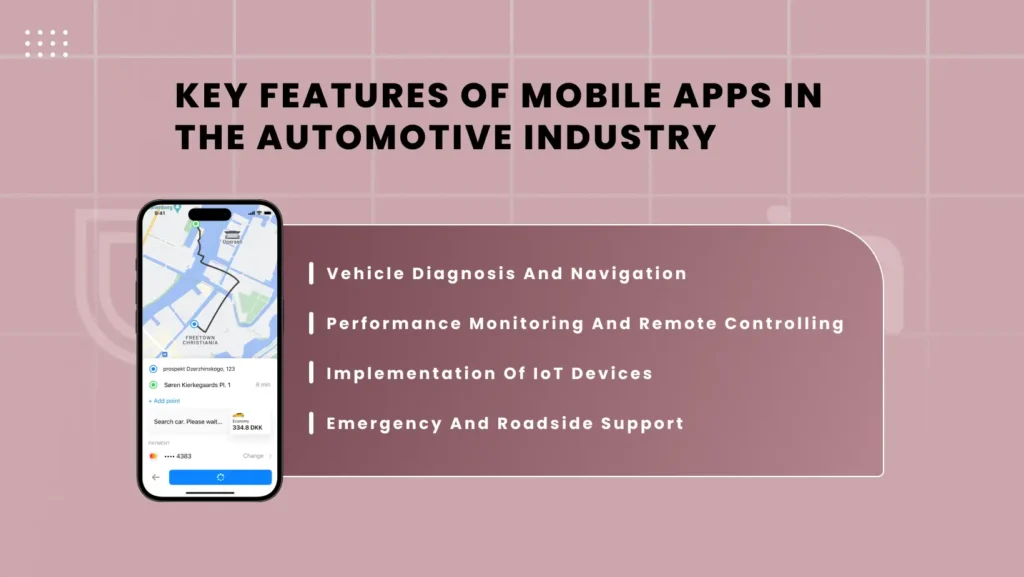
Key Features of Mobile Apps in the Automotive Industry
The following key features are involved while developing a mobile app for the automotive industry:
Vehicle Diagnosis and Navigation:
Mobile apps provide the feature to diagnose their vehicle and monitor the vehicle’s health in real time. Additionally, it ensures the maintenance alert on time and schedule appointment for vehicle service.
Performance Monitoring and remote controlling:
Providing users with remote control of their vehicles such as locking/unlocking the doors, tracking the location of the vehicle, and many others. Furthermore, it provides a performance monitoring feature to the user with this the user monitors their vehicle performance.
Implementation of IoT devices:
Implementation of the IoT devices on the system is useful to enhance the user’s experience as well as provide many additional features to our vehicle.
Emergency and Roadside Support:
Mobile apps provide features like emergency assistance and roadside support. It assists users in emergencies and helps to tackle emergencies.
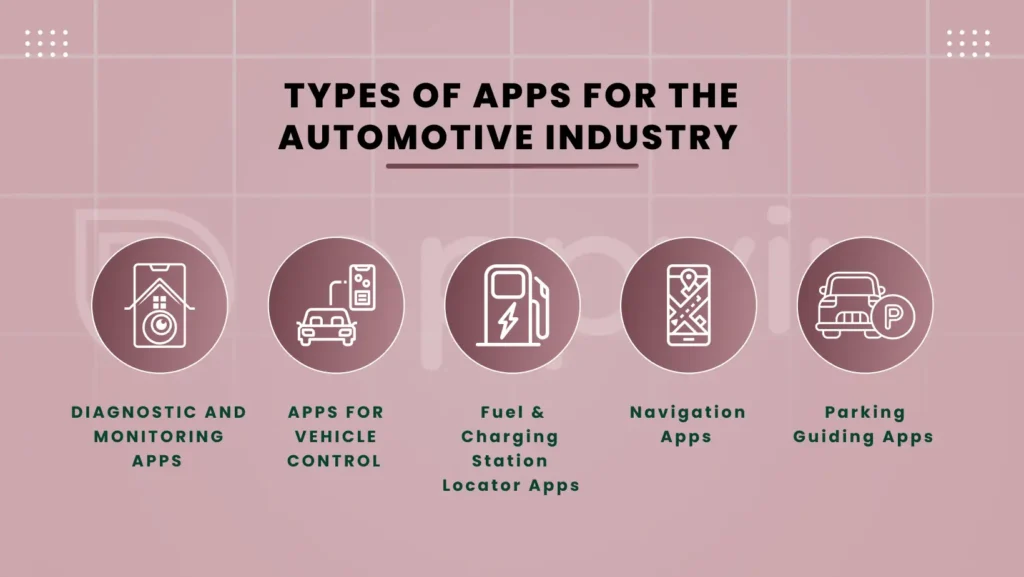
Types of Apps For The Automotive Industry
Diagnostic And Monitoring Apps:
These are like the health monitors for your cars. They keep an eye on your vehicle’s performance.
Apps For Vehicle Control:
These are revolutionizing how we interact with our vehicles. Imagine starting your car or adjusting the temp from your phone- that’s the magic of IoT integration. These apps blend convenience with innovation, making your car not just a mode of transport, but a smart device on wheels.
Fuel & charging station locator apps:
Fuel and charging station apps help users find nearby fuel stations for vehicles as well as charging stations for electric vehicles. Furthermore, it provides information regarding the prices of the fuel, and station services, and helps users to find the route to the charging station.
Navigation apps:
Navigation apps provide information about the route and also help to analyze the real-time traffic. Moreover, it helps the user by locating the shortest distance to their destination. Additionally, these apps also include the features of offline maps, voice-guided navigation, and many more.
Parking guiding apps:
Parking guiding apps assist users in vehicle parking. It gave information about the space availability while parking and also provided information about the parking charge and assisted with the parking restriction areas.
User Experience and Smart Cars
Smart cars will be the designs of the future! IoT is not just about connecting your car to your smartphone but also relates to 3 party tools.
Driverless cars are going to play a huge role in the coming years.
Challenges
The following are the key challenges while developing a mobile app for the automotive industry:
Security:
Security is an important part of any industry. Furthermore, with the high use of mobile apps, security becomes part of the concern, as many cyber threats are happening to breach the security of the system.
Data Privacy issue:
Collecting the user’s data from the developers and managing their data is crucial in terms of data breaches. Consequently, mobile app developers ensure to provide security and protect their data.
Updating of apps:
Regular updating of apps become a challenging task for the industry. The updation in apps is needed to compete with the market.
Performance Optimization:
Mobile apps developer ensures the performance optimization of their apps in terms of battery consumption, memory management, and many more.
Network Connectivity:
The apps may ensure network issues, and data usage, and work to optimize their functionality and enhance the user experience.
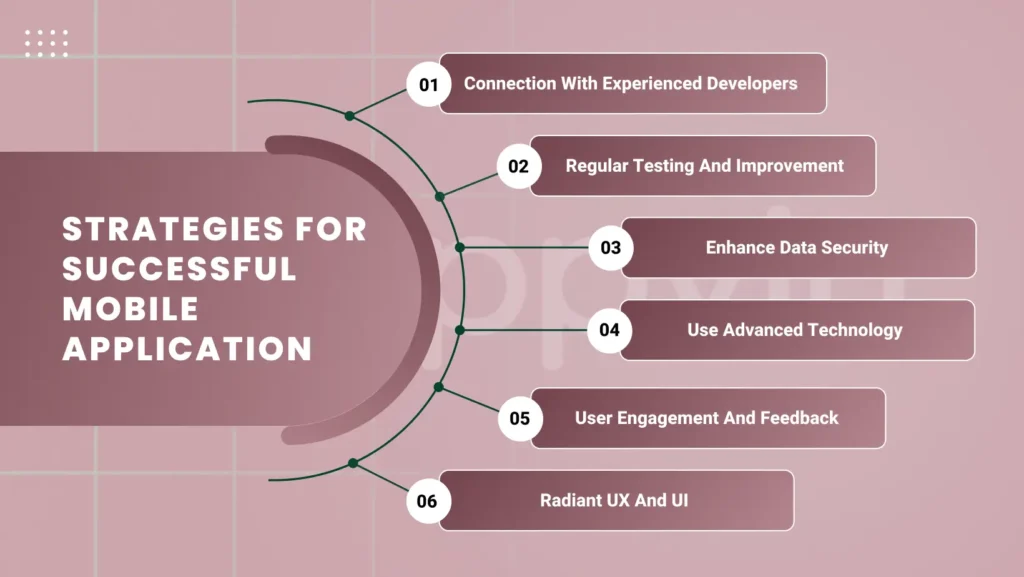
Strategies for Successful Mobile Application
Connection with Experienced Developers:
Connection and collaboration with experienced developers help to reduce complexities in mobile applications. Moreover, they ensure the successful delivery of the product and provide high-quality products.
Regular Testing and Improvement:
Regular testing provides improvement in the apps and refining apps. This results, in obtaining the complexities and reducing the bugs.
Enhance data security:
Provides the security of the data to secure it from malware, hacks, and other market frauds.
Use advanced technology:
Using advanced technologies like Artificial intelligence, and cloud computing, blockchain provides benefits to mobile apps and the system. Additionally, it includes standardization, flexibility, scalability, and low operational costs.
User Engagement and Feedback:
Taking user feedback will be beneficial for monitoring the app’s performance, reducing errors, and finally improving the app.
Radiant UX and UI
Better UX and UI of an app help the user to understand the features and make the user experience better.
Conclusion
Mobile apps have become an essential component of the automotive industry. Developing mobile apps can help dealerships, improve customer experience and increase sales.
In conclusion, the services provided by automotive development companies play an important role in shaping the future.
Through innovative mobile app development for the specific needs of the automotive industry, our company provides users with to access a wide range of features and functionalities that streamline operations, enhance connectivity, and elevate the overall user experience.
Partnering with AppVin Technologies, a leading mobile app development services company, provides access to cutting-edge solutions and a collaborative relationship built on trust and shared objectives.
FAQs
What software is used in the automotive industry?
Software used in the automotive industry includes CAD (computer-aided design) for design, PLM (Product Lifecycle Management) for lifecycle management, ERP (Enterprise resource planning) for business processes, MES (Manufacturing execution system) for manufacturing, CAM/CRM for machining and customer relations, and AR/VR (Augmented Reality/Virtual Reality) for immersive experiences. However, these tools enhance efficiency, accuracy, and innovation throughout the automotive lifecycle, from design to production to sales and maintenance.
How can AI be used in the automotive industry?
In the automotive industry by enabling autonomous driving, enhancing safety features, predicting maintenance needs, personalizing user experiences, optimizing supply chains, ensuring quality control, and providing customer support. It includes standardization, flexibility, scalability, and low operational costs.
Which programming language is best for the automotive industry?
The languages used in the Automotive industry are C/C++ for embedded systems, Python for AI and data analysis, Java for Android-based infotainment, MATLAB/Simulink for modeling and simulation, Assembly for low-level hardware, HTML/CSS/JavaScript for web interfaces, and Rust for safety-critical software.
Is Python used in the automobile industry?
Yes, Python is used in the automatic industry for data analysis and to manage artificial intelligence.



